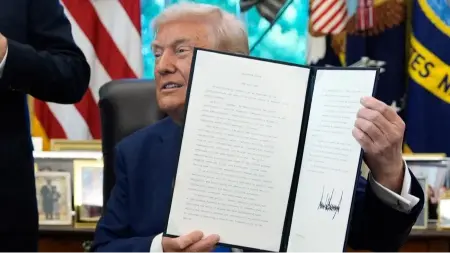September 23, 2025
A new $100,000 H‑1B visa fee introduced under Trump’s administration has drawn criticism from the tech industry, which warns it could stifle innovation and hinder growth.

The United States is witnessing a growing backlash against the introduction of a new $100,000 H-1B visa fee, a policy initiative announced under former President Trump’s administration and now facing heightened scrutiny. Tech companies, industry groups, and immigration advocates are warning that the unprecedented fee could have far-reaching consequences for the US technology sector, innovation, and economic growth.
The H-1B visa program, which allows US companies to employ highly skilled foreign workers, particularly in fields like information technology, engineering, and scientific research, has long been a critical component of America’s talent pipeline. By placing a steep financial barrier on companies seeking to hire international talent, critics argue that the new fee will disproportionately impact startups and mid-sized firms, which rely heavily on overseas talent to fill key roles. The tech industry has raised concerns that the measure could slow project timelines, reduce competitiveness against global counterparts, and ultimately result in fewer jobs for American workers due to delayed expansion.
Industry associations, including the US Chamber of Commerce and the Information Technology Industry Council (ITI), have released statements urging policymakers to reconsider the measure. They argue that the $100,000 fee is not only punitive but could also trigger unintended consequences, such as encouraging tech talent to relocate to countries with more favorable immigration policies, including Canada, Germany, and Australia. Several major technology firms have already warned of potential layoffs and halted hiring plans if the fee is implemented, suggesting that the policy may inadvertently weaken the very sector it aims to regulate.
Immigration lawyers and policy analysts note that the fee represents one of the largest financial burdens ever placed on the H-1B program. Historically, the visa program has had associated administrative costs, but this new fee represents a dramatic escalation, likely to influence corporate hiring strategies significantly. Companies are now considering alternatives, such as transferring key personnel to other international offices or shifting projects abroad, which could result in slower innovation and reduced US competitiveness in the global technology market.
Beyond the immediate economic impact, the fee has raised broader debates around US immigration policy. Supporters of the fee argue that it could help protect domestic workers by discouraging overreliance on foreign labor, while opponents contend that it undermines America’s reputation as a global hub for innovation and entrepreneurship. They emphasize that foreign-born talent has historically been a cornerstone of the US tech sector, contributing to major advancements in software, artificial intelligence, biotechnology, and more.
Legal experts predict that the policy could face court challenges on several grounds, including its potential violation of existing federal regulations governing the H-1B program. Advocacy groups are already preparing petitions, lobbying Congress, and mobilizing public opinion to highlight the economic and social costs of implementing such a steep fee. If successful, these efforts could force the administration to reconsider or scale back the policy.
Additionally, economists warn of secondary effects. With the US technology sector heavily integrated into global supply chains, increased visa costs could lead to higher prices for consumers, slower adoption of new technologies, and a decline in foreign direct investment. Some analysts suggest that the measure could inadvertently give a competitive edge to countries with more welcoming immigration policies, shifting the global distribution of tech talent away from the United States over the next decade.
In conclusion, the $100,000 H-1B visa fee has sparked significant controversy, highlighting tensions between immigration policy, economic growth, and global competitiveness. While the government defends the fee as a mechanism to protect domestic employment, industry leaders and analysts argue that its unintended consequences could outweigh its intended benefits. As the debate unfolds, policymakers, corporations, and advocacy groups will closely monitor its impact on the US technology sector and the broader economy.